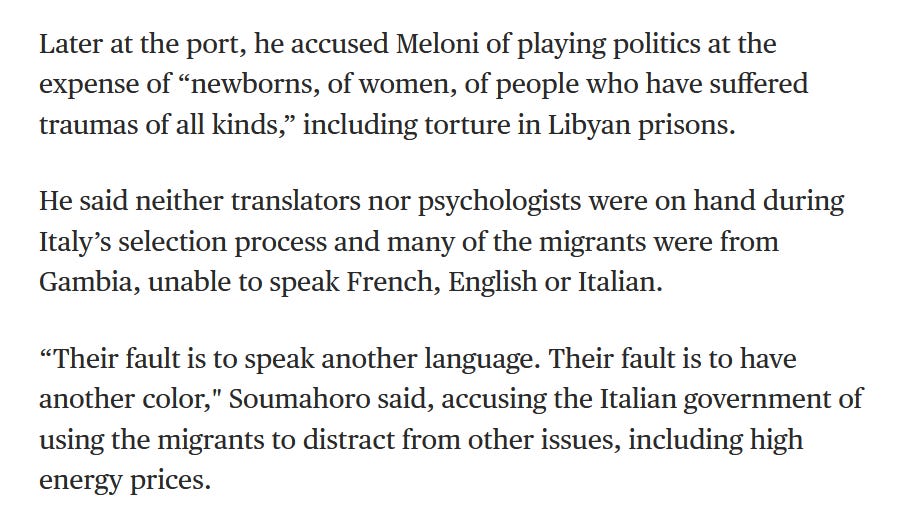Passports to belonging and the elusive travel shoe
Mutability, inscrutability, blending in, fashion, and who can call themselves a citizen
Friends, it has been too long. It has been over a month since I sat on the grounds of a hotel in Sicily and jotted down an idea for a future edition of Turtleneck Season. Since returning from my honeymoon, I’ve struggled more than usual to fit life in around the margins of a full-time job, and have found myself defaulting to an uptick in socializing to distract myself from what feels like a mundane reality. Writing has been shoved to the margins and I’ve been indulging in a diet of low-brow culture—Love is Blind (Season 3), The Palace Papers—with minimal critical reflection.
Lacking fresh inspiration, I’ve flipped back to my note from early October, where I remarked upon my consistent anxiety about being recognized as an American while traveling. I’ve traced this anxiety back to the aftermath of 9/11, when I made my first trips to Europe during the jingoist George W. Bush presidency. At age 13, I was cognizant that Bush’s Texan brand of America—with which I didn’t identify in the slightest—was deplored internationally, especially in France. Even then, I felt “freedom fries” signified patriotism gone awry. Though Americans had always been unapologetically loud and hapless—resistant to the formalities and trappings of European class consciousness since our founding—Bush helped further collapse Americans’ political and cultural identities into a singularly xenophobic and philistine aggressor. We were viewed as stupid for having elected a president who could barely read and resented for having duped the world into invading Iraq under false pretenses. This disdain was directed at anyone who deigned to wear shorts or sneakers or a baseball cap in Paris. To avoid being on the receiving end of such scorn, some American tourists even got into the habit of pretending to be Canadian.
Two decades later, far-right so-called populism and xenophobia is on the rise globally, and Europe can hardly point a mocking finger at the United States anymore—I arrived in Sicily on the day that Italians elected Giorgia Meloni prime minister. And yet, the Bush-era political backstory is still part of what I tell myself to justify my habit of buying multiple pairs of new shoes for each trip to Europe—to defend myself against potential derision by not allowing it to be so obvious that I am, indeed, a born-and-raised U.S. national.

As I have grown up and traveled more, there have been moments when I have tasted the thrill of my own mutability in Europe. My crowning achievement was being asked for directions in Milan. A desire to blend in has subsumed my fear of recognition, and I can’t help but chase the privileges that come with my successful efforts at being mistaken for a native. I still remember the shoes I bought in Paris when I was sixteen, when I spent six weeks studying art history and French literature under the tutelage of a cadre of chain-smoking Parisians. “Caroline - tu resemble une Parisienne aujourd’hui,” our septuagenarian history teacher remarked with a nod of approval when I showed up for class in new yellow espadrille wedges. The compliment was intoxicating. I was realizing I might not ever be able to sound French, but I could look French—or French enough—and looking French, I realized, was sometimes enough to confer social privileges that accompany not being taken for a tourist - perhaps a better table in a restaurant, faster service at a bar, insulation from hawking street vendors, not being ripped off by a taxi driver. Lacking fluency in any language other than English, this privilege is often ephemeral and lasts only as long as I can keep from opening my mouth. Then, the most I can hope for is being asked where I’m from. But sometimes, I can order a coffee or ask for a table in French or Italian with enough confidence that I manage to successfully navigate the transaction without the shame of being immediately shunted a laminated English menu.

The stakes feel higher in a country to which I can trace my own origins. I’m a quarter Italian—my father can trace his ancestry back to his grandparents born in Sicily.1 My name is thus unmistakably Sicilian, but unlike my dark-haired and olive-skinned cousins, I don’t look it. In Italy, I nevertheless hope that I exude some intangible essence that will allow me to slip into the population, but deep down sense, with a twinge of sadness, that the intervening generations of intermarriage have rendered me irrevocably American. Without more than a single grandparent to link me back to any quadrant of my heritage, my connection to any cultural identity feels tenuous. And so I make an effort - with language, with fashion - to fit in. When in Rome.
Without going into a whole lot of handwringing, I’ll acknowledge that my ability to even engage in this form of cultural cosplay obviously is grounded in the fact that I’m white. Italy is not exactly a multicultural society, and it struck me that, with a few exceptions in Rome, the only middle-class people of color I saw on our honeymoon were North American tourists. Like a whole lot of other countries, including my own, Italy is grappling with who gets to belong there. But for Italy, the debate is exacerbated by the fact that, along with Greece, Italy functions as Europe’s southern border and bears the brunt of the humanitarian crisis that is cross-Mediterranean migration.
Meloni and her far-right coalition government are openly anti-immigrant and unapologetically nationalist. Though Meloni seems to be gaslighting the world by disclaiming her party’s fascist roots, even the name of her political party, the “Brothers of Italy” (Fratelli d’Italia) somewhat menacingly suggests that Italy is for Italians. Remarkably, “Italians” includes me, with my ancestral ties through my paternal grandfather. I recently learned that this genealogical fluke entitles me to claim Italian citizenship jure sanguinis (by bloodline), despite the fact I have only a fledgling grasp of the language and have spent a collective eight weeks in the country in my entire life. With citizenship, I could come and go as I pleased, stay as long as I wanted, work, and claim social benefits. By contrast, the ruling party would not only deny these legal rights and privileges to refugees from North African and the Middle East, but would deny them entry. Meloni’s new government is flexing—making headlines this week by refusing asylum-seekers, trapped on board humanitarian vessels that have called port in Italian harbors, to disembark to claim asylum. The government seems intent on forcing the NGO rescue ships, which pick up distressed migrants attempting to cross the Mediterranean on overcrowded fishing boats, back into international waters in violation of international law.
Blood—and thus skin color—often remain dispositive of who is allowed to belong. (Somewhat ironic given that Italian-Americans didn’t really become “white” in the U.S. until after World War II.2) As I insisted on checking into hotels and ordering my nightly spritzes in Italian on my most recent trip to Sicily, perhaps I was trying to earn this privilege of potential citizenship. I wanted to transcend my U.S. passport and feel a connection with the people who inhabit one of the many places I am from, to be taken as one of their own. And though I do feel a connection to so much of the culture — the pace, the food, prioritizing beauty in all its forms — I was reminded by the polite nods of the servers to whom I disclosed my Sicilian origins, despite my best efforts, to them I am just another foreigner. (Though Americans often define and self-categorize based on where our ancestors hail from, traveling abroad always reminds me that our distinctive navy blue passports are the lens through which the rest of the world will always see us first.) My efforts to belong carry me only so far.
The idea that a country can limit who belongs is inherent in the very notion of sovereignty. Countries control who enter, who can stay, and who can stay with the privileges of citizenship. They each define citizenship for themselves. Italy’s decision to offer citizenship to its citizens’ descendants is part of a patchwork system in which some countries, like the U.S., offer citizenship as a birth right; in others, like Japan, it is a blood right.
I’m still parsing through my reasons for desiring Italian citizenship, which are not unrelated to my reasons for wanting to blend in somewhere else. The desire to transcend oneself is human; it is enormously powerful to finally feel a sense of belonging in a place that you are not from. In some ways, it is a form of invisibility, in which one’s true roots are masked. Inscrutability can be a midway point on that journey. But refuge in a country should not require someone to transcend their origins; our international legal system of asylum turns on the notion that one’s origins—one’s impossible situation in their home country—is the very basis of their claim for asylum. The subsequent question of citizenship requires a nation to decide for itself whether residents must exhibit a degree of linguistic and cultural fluency to attain equal rights and privileges in a society, or whether they are presumed to possess that fluency by being born in the country, or being born to citizens. But it certainly shouldn’t depend on one’s shoes.
Many Sicilians—or Italians from elsewhere in Italy—will be quick to tell you that being Sicilian is not the same as being Italian. Sicily was incorporated into unified Italy in 1860, but has functioned as an autonomous region with its own Parliament and Constitution since 1946.
The story of how Americans of Italian descent (particular from Sicily and southern Italy) became “white” is fascinating in itself, and part of this country’s broader ugly history of racism and white supremacy in which immigrant group after immigrant group has striven to attain whiteness, at the expense of Black comrades in labor. The Irish and the Jews have similar stories of outgrowing their “ethnic identities,” and one day soon, so might Asian-Americans, posits the writer Jay Caspian Kang in his new work of genius, in which he discusses the scholarship of Noel Ignatiev.



